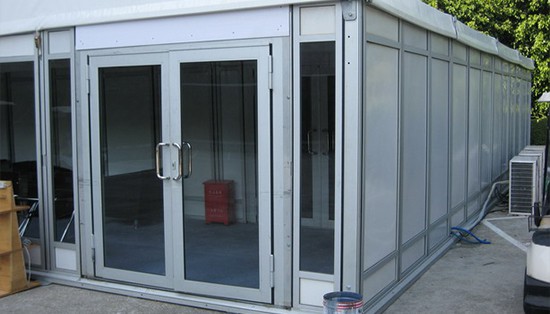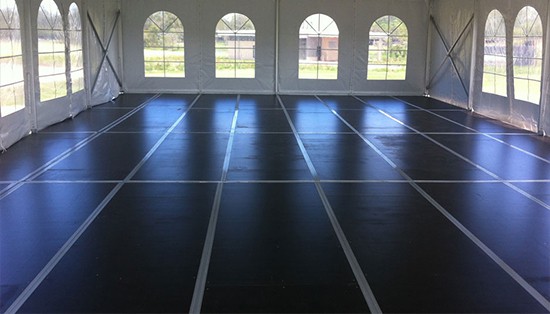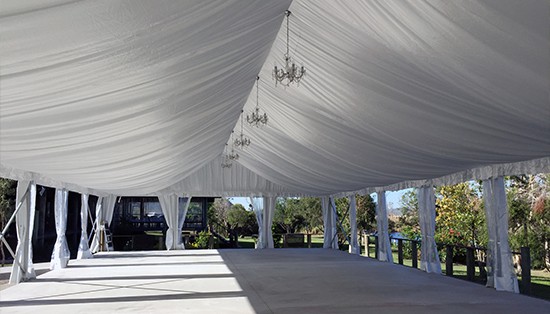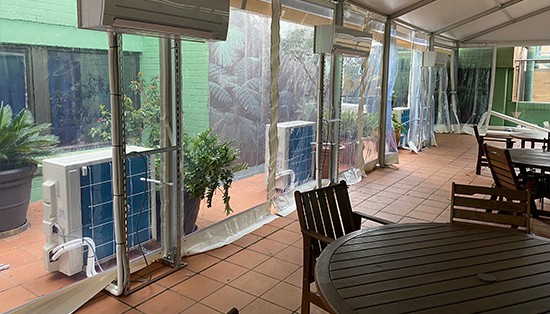Everything You Need to Know About Wedding Tent Extras
Planning a wedding? You’ll want to have proper shelter to host activities like dining, dancing, games and sometimes even the ceremony itself. When looking for the perfect wedding tent for your wedding or rental business, there are several factors to consider, including size, shape and tent extras. This guide focuses on the latter: wedding tent extras. Below, our tent manufacturers discuss the ins and outs of wedding tent extras: what they are, what they do and which ones may be useful for you.
Why Order a Wedding Tent?
When planning a wedding, there are several essentials that you should have squared away well before the big date. Among these essentials is a source (or several sources) of shelter. Whether you represent a rental company, wedding venue or the wedding party itself, you’ll want to be sure that you have shelter scheduled and set up well in advance of the wedding. This is especially true for outdoor weddings, which are subject to ever-changing (and often inclement) weather.
When searching for a shelter solution for your next wedding, you’ll want to find a product that’s protective, versatile and high-performing. Though permanent shelter sources like gazebos, pergolas and other outdoor structures can be nice, they are costly to construct, often difficult to book and unmovable. Wedding tents, by comparison, are affordable, versatile and designed to be set up in a number of areas to suit each wedding party’s specific needs. When designed and manufactured by a reputable manufacturer, wedding tents can provide ample protection from inclement weather and last a lifetime. They can also be outfitted with a number of extras to augment the experience for all those inside.
What are Wedding Tent Extras?
When stripped down to its bare bones, a wedding tent is a custom-sized source of shelter designed for wedding parties and activities such as dining, dancing and other ceremonies. Beyond the bare bones, wedding tents can have a number of extras designed to augment user experience and enhance tent performance overall. These extras include wall add-ons for extra all-weather performance, lighting additions, specific types of flooring, winterization extras and more. Depending on the type of wedding you’re hosting (as well as where you’re hosting it), you may want to consider one or all of these wedding tent extras for your needs. Read on to learn more about the benefits and details of each wedding tent extra.
Walls
Most wedding tents come with walls as a standard feature. However, in the event of extra-inclement weather, standard tent walls aren’t always enough. An extra layer may be purchased to fortify your tent against rain, wind and other unwanted weather. On the other side of your wedding tent’s standard wall, there is the interior to consider. This is the surface that wedding guests will interact with, so it should look as welcoming and luxurious as possible. To give your wedding tent walls a bit of a facelift from the inside, you can purchase liner. Liner is special material designed to cover wedding tent walls and add an extra degree of ambiance and luxury to any tent.
Designing a custom tent from scratch? You’ll have several options to consider for your wedding tent wall. Among these options are a number of different wall types, including solid walls, clear walls, cathedral walls (walls with windows) and fabric walls. Each of these wall types has its unique advantages. For instance, solid walls provide the most weather-protection, but they do not provide the views that come with clear or cathedral walls. Planning a wedding in a dry and temperate location? You may be able to skip walls altogether. Anticipating precipitation? Stay away from fabric walls. Though soft and elegant, they’ll soak through.
Flooring
Moving from the walls to the floors, flooring is yet another wedding tent extra to consider when ordering and outfitting your wedding tent. When choosing a floor for your wedding tent, you essentially have two options to consider. The first option is the plain old ground—otherwise known as no floor at all. The second option is a synthetic flooring material that is laid underneath your wedding tent. The obvious advantage of no flooring is price. No floor means no money spent. However, opting for the plain old ground under your feet can have its drawbacks. In the event of inclement weather, plain ground can get quite soggy. It can also be sloped or irregular, which can make walking difficult for wedding guests (especially those in heels). Though wedding flooring is considerably more expensive (most floor prices run somewhere between one and four dollars per square foot), wedding floors have the advantage of elegance, levelness and weather resistance.
Lighting
Lighting is an essential for any wedding tent. As most weddings extend well into the evening hours, lights are necessary for visibility above all else. However, the lighting in your wedding can do much more than simply help people see when it gets dark out. The lighting in your wedding tent plays a large role in building the ambiance of the wedding space. Tastefully-executed wedding tent lighting can make all the difference in transforming a wedding from ordinary to magical.
When choosing lighting for your wedding tent, you’ll find that there are a myriad of options available. String lights can be fastened to the tent’s roof and walls; bistro lights can be strung across the ceiling; lanterns can be hung, and freestanding lights can be artfully placed across a tent’s interior. These are just a few options among many. Many wedding parties choose to invest in lighting hardware with dimmers to create different moods for different moments of the wedding. Whatever lighting option you choose, just be sure that you have the power sources to handle your light sources and that your lights will fit within the dimensions of your tent.
Heating, Cooling, and Other Weatherizing Options
Sure, ambiance is important, but physical comfort should take precedence over all else in the wedding planning process. To ensure that your wedding guests stay comfortable in your tent, you may want to consider investing in climate control hardware like heaters, fans and portable AC units. Hot and humid summer weddings can often overheat guests, especially when the greenhouse effect sets in inside a wedding tent. To keep guests cool, consider outfitting your tent with a few freestanding fans or hanging fan units. There’s also the opposite side of the temperature spectrum to consider. When night falls, so do outdoor temperatures. To keep guests inside your wedding tent warm, invest in a few space heaters to strategically place throughout your interior. (This is especially important for spring and fall weddings, where temperatures are known to sit on the cooler side.)
Heating and cooling units aside, there are a number of other wedding tent extras that can be used to protect against the weather, optimize tent performance and improve the overall comfort of wedding guests. Among these additional wedding tent extras are rain gutters, clip-on wheels and weight plates, to name just a few.
Choosing Your Wedding Tent and Wedding Tent Extras: Factors to Consider
Wondering which type of wedding tent to order? Want to know which wedding tent extras you’ll need? Here are a few factors to consider to help you with your decision-making process.
- Space. Before buying a wedding tent, you’ll want to determine how much space you’ll need. Space requirements are largely determined by the number of guests attending your wedding and the number of items (such as tables and decorations) that will be placed inside your tent. Once you have a good estimate of the size of the tent you’ll need, you can begin to plan which extras to add onto your tent. The bigger your tent is, the more resources will have to be allocated for extras like heating, cooling and flooring. In many cases, you can plan to designate certain areas for certain extras. For instance, you can add flooring only for a dancefloor and bring heating only to seating areas.
- Weather. Another huge factor in determining which type of wedding tent and wedding tent extras you’ll need is weather. Pay close attention to the weather patterns in your region and the typical weather projections for target wedding seasons. These metrics will help you determine whether you need to invest heavily or lightly in weatherproofing materials and add-ons such as extra walls, heaters and flooring.
- Wedding Aesthetic. Considerations such as space and weather aside, a wedding’s overall aesthetic is important to consider when choosing a wedding tent and wedding tent extras. Luxurious weddings often demand the highest degree of class and ambiance, so ample lighting, flooring and wall liners are all necessities. For more rustic weddings, or those where the tent is only hosting an activity or two, many extras and weatherization materials can be skipped.
Learn More About Wedding Tent Extras and Shop Tents and More with Extreme Canopy
Want to learn more about wedding tent extras? Ready to order your wedding tent and its extras right now? You’re in the right place. Contact our team to have your wedding tent-related questions answered, and shop high-quality tents and tent accessories from our industry-leading manufacturers today!





